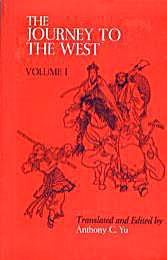Book: Journey to the West by Wu Cheng'en
Written: 16th century
Country: China
Description: Journey to the West is a classic Chinese mythological novel. It was written during the Ming Dynasty based on traditional folktales. Consisting of 100 chapters, this fantasy relates the adventures of a Tang Dynasty (618-907) priest Sanzang and his three disciples, Monkey, Pig and Friar Sand, as they travel west in search of Buddhist Sutra. The first seven chapters recount the birth of the Monkey King and his rebellion against Heaven. Then in chapters eight to twelve, we learn how Sanzang was born and why he is searching for the scriptures, as well as his preparations for the journey. The rest of the story describes how they vanquish demons and monsters, tramp over the Fiery Mountain, cross the Milky Way, and after overcoming many dangers, finally arrive at their destination - the Thunder Monastery in the Western Heaven - and find the Sutra. (from Amazon.com)
My Thoughts: I really liked all the poems scattered throughout the book, especially the ones about the beauty of nature. There were some really beautiful poems. Having poems embedded in the story forced me to slow down as I read, if only because I've always felt that poems should be read slowly. I've read that Chinese books are meant to be read slowly and savored (although I have no idea if this is true; I was unable to confirm or deny with a quick Google search), but it wouldn't surprise me after reading Journey to the West. I also found that I enjoyed it more when I did read it slowly.
I'll admit that, at times, I had some difficulty finishing Journey to the West. My difficulty was mostly due to the length--I read a complete, unabridged translation, which means that there were one hundred chapters and four separate volumes--but also due to the sometimes-repetitive-seeming adventures. I think a lot of my boredom with some of the adventures has much more to do with my ignorance of Chinese culture and Buddhism, however, than it with the story and writing itself. The introduction said that it is a story full of metaphors, references, and symbolism. Some of it was explained in the notes of the book, but much of the symbolism, especially, was not. I would imagine that each adventure symbolized a worldly attitude or sin in the Buddhist tradition and understanding.
I'm sure you're wondering about the religious aspect of this epic. Yes, it was Buddhist, but I still found it enjoyable and incredibly interesting. I understand that Chinese Buddhism is different from Buddhism of almost anywhere else because of the mix of Taoism and traditional Chinese beliefs it also includes, and that definitely appeared in Journey to the West. The ultimate goal of both Buddhism and Taoism is for humans to achieve immortality through self-cultivation, and both religions were true in the story in that both were successful at creating immortals through their disciplines. At times the group met and were even helped by Tao immortals, but there was a sense that Buddhism was somehow "better."
As for the characters, the Monkey King was absolutely my favorite. He was mischievous, the best fighter, and determined. (This may have been because I found most of the immortals thoroughly irritating and arrogant, and I enjoyed watching him wreak havoc among them. I'm not sure how much of that irritation was simply cultural differences, and I apologize if I'm being insensitive. Also, I know it's not very Christian of me.)
I'll admit that, at times, I had some difficulty finishing Journey to the West. My difficulty was mostly due to the length--I read a complete, unabridged translation, which means that there were one hundred chapters and four separate volumes--but also due to the sometimes-repetitive-seeming adventures. I think a lot of my boredom with some of the adventures has much more to do with my ignorance of Chinese culture and Buddhism, however, than it with the story and writing itself. The introduction said that it is a story full of metaphors, references, and symbolism. Some of it was explained in the notes of the book, but much of the symbolism, especially, was not. I would imagine that each adventure symbolized a worldly attitude or sin in the Buddhist tradition and understanding.
I'm sure you're wondering about the religious aspect of this epic. Yes, it was Buddhist, but I still found it enjoyable and incredibly interesting. I understand that Chinese Buddhism is different from Buddhism of almost anywhere else because of the mix of Taoism and traditional Chinese beliefs it also includes, and that definitely appeared in Journey to the West. The ultimate goal of both Buddhism and Taoism is for humans to achieve immortality through self-cultivation, and both religions were true in the story in that both were successful at creating immortals through their disciplines. At times the group met and were even helped by Tao immortals, but there was a sense that Buddhism was somehow "better."
As for the characters, the Monkey King was absolutely my favorite. He was mischievous, the best fighter, and determined. (This may have been because I found most of the immortals thoroughly irritating and arrogant, and I enjoyed watching him wreak havoc among them. I'm not sure how much of that irritation was simply cultural differences, and I apologize if I'm being insensitive. Also, I know it's not very Christian of me.)
Enjoyed, even with the Buddhism--honestly, it was fascinating to read a Buddhist anything, as it's not a religion that I know much about, and it was a good, epic adventure story. I would, however, perhaps would recommend an abridged version...

No comments:
Post a Comment